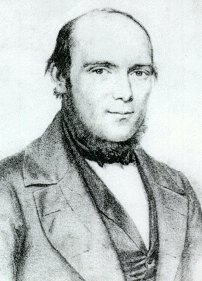
Karl Ernst Adolf Anderssen (6 July 1818 – 13 March 1879) was borned in Breslau(Wroclaw), German chess master. He won the great international tournaments of 1851 and 1862, but lost matches to Paul Morphy in 1858, and to Wilhelm Steinitz in 1866. Accordingly, he is generally regarded as having been the world’s leading chess player from 1851 to 1858, and leading active player from 1862 to 1866, although the title of World Chess Champion did not yet exist.
Anderssen became the most successful tournament player in Europe, winning over half the events he entered, including the very strong Baden-Baden 1870 chess tournament. He achieved most of these successes when he was over the age of 50.
Anderssen is famous today for his brilliant sacrificial attacking play, particularly in the “Immortal Game” (1851) and the “Evergreen Game” (1852). He was an important figure in the development of chess problems, driving forward the transition from the “Old School” of problem composition to the elegance and complexity of modern compositions. He was also one of the most likeable of chess masters and became an “elder statesman” of the game, to whom others turned for advice or arbitration.

Anderssen died on 13 March 1879, in his home town. The Deutsche Schachzeitung noted his death in 1879 with a nineteen-page obituary. His cause of death was a heart attack. Bombing raids during World War II damaged his grave in Breslau. After the war, the city became part of Poland and is now known under its Polish name Wrocław. In 1957, the Polish Chess Federation decided to re-bury Anderssen in a new grave at the Osobowice Cemetery.
